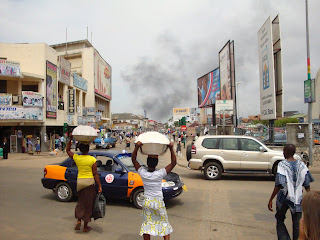
Written by Matthew McAuliffe - Volunteer Challenge, Ghana 2009
Photos provided by Matthew
My first day in Accra commences at about 6am, being woken by the very loud music playing right outside my window, not to mention the array of car horns, people singing and crowing roosters. The city of Accra (and the entire country of Ghana) never sleeps in, not even on a Sunday. After climbing out of bed I take a cold shower with a bucket, which I soon learn will be the daily ritual of my six weeks here.
I am immediately taken by the view from the sitting area at the front of our hotel. On one corner is a little store no bigger than a very small backyard shed, selling bread, sweets and phone recharge vouchers. Immediately across the road from that is a football pitch without a skerrick of grass to be seen full of young men in the midst of game. It is Sunday morning in Ghana and the street is fairly busy with the locals in their Sunday best heading to their various Churches and I spend the next few hours just sitting at a table at the front of our hotel just taking in the view in front me. While the scene may not be able to be described as breathtaking in the sense of a beautiful waterfall or a pristine beach, the view contains so much intricacy and detail it is hard not to be captivated by it. From the amazingly dressed people strolling past, the goats running through the football game or the men, women and children selling everything from toothpaste to fresh bread on their heads, it is truly a fascinating sight.
One of the first things you notice when taking a walk through Accra is the smell. The sewer and drainage systems here are quite primitive. Basically there is a sort of trench about a foot, sometimes up to a metre, deep that runs along side the roads. This system of trenches serves as the pipeline for sewage and any other waste put into it. While this description may sound particularly underwhelming, one doesn’t get a feeling that Accra as a city is so filthy that you cannot interact with it. In fact, Accra presents itself with a certain messy and unorganised charm due mostly to its people.
Part of this charm is the extreme happiness that most Ghanaians exude. If they choose not to call out to you, as most do, they will just break into laughter. I am not yet sure if they are laughing at, or with us white people but nevertheless their chuckles are contagious. In fact, most greetings involve a shaking of hands and then half a minute of just laughing at each other. Another aspect to this charm is the Ghanaians relaxed nature. If you are coming to Ghana with expectations of western service I would suggest you don’t come. “In five minutes” is a line that seems to have no meaning whatsoever but is fed to you whenever you ask how long something will take. We waited over 2 hours for our dinner on the first night when there was nobody else at the hotel. I have no idea why food, or any other request takes so long wherever you go but it just seems to be the Ghanaian way... “in five minutes”.
The following day our orientation begins with our introduction to Tina, our ‘big black mama’ as she describes herself. She heads the volunteer organisation here and in many senses is our big black mama. She is big, black and takes responsibility for our every need. I should note that Ghanaian culture is very different to western culture in the way that you can talk about people. In Ghana there is no racial innuendo in making the statement such as ‘that man is a black man and that man is a white man’ or maybe ‘you are so black and I am so white’. It is purely descriptive. When you walk through the streets of Ghana, particularly the villages, everybody shouts “Obruni, Obruni” which means white man or man from the horizon. The calling is by no means disrespectful, rather it’s just that everyone wants to talk to you. Imagine shouting “black man black man” every time you saw a black man walking through the streets of Sydney. I guess in many ways it has to do with the rarity of obruni’s. There are so few white people you are very very noticeable. A lot of Ghanaians in the less frequented villages have only ever seen a handful of white people in their lifetimes.
The activities during our first week in the capital consist of an intro to the do’s and do not’s of Ghanaian culture such as one must only ever eat or pass a gift with their right hand, or that being of larger weight is considered attractive here. You can even buy medicine to assist you to gain weight! After our morning of information taking we spend the afternoon at Labardi beach relaxing and enjoying the 30 degree winter’s day.
The rest of the week’s activities consist of being taken on a city tour of Accra and Accra’s main market (which is an amazing experience), visiting a unbelievably strange coffin maker (think beer bottle and aeroplane coffins), trying our hands at some Ghanaian cooking, dancing and drumming and receiving further information concerning our host families and volunteer placements. After a week of getting to know the other volunteers (and exchanging contact details so that we can meet up on weekends to travel the country) we head our separate ways to all corners of the country to our respective host families and volunteer placements. Tomorrow, for me, Agona Swedru!!



No comments:
Post a Comment